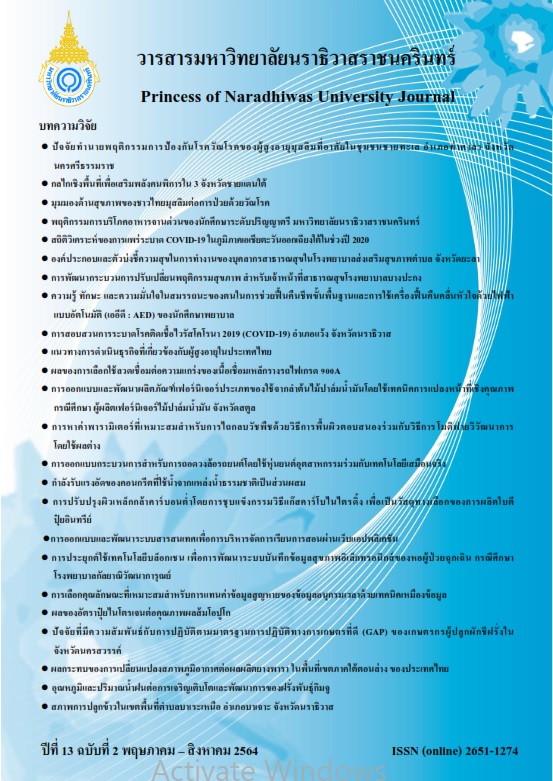Fast Food Consumption Behavior of Undergraduate Students of Princess of Naradhiwas University
Keywords:
Fast food, Behavior, Consumption, Princess of Naradhiwas UniversityAbstract
This is a survey research aiming to study and compare fast food consumption behavior of undergraduate students of Princess of Naradhiwas University which was classified by gender, age, BMI, religion, year, faculty and income. The samples of this study consisted of 341 undergraduate students studying at Princess of Naradhiwas University in academic year of 2020. The sampling size was calculated by Tara Yamane’s formula, and the sampling group was selected using stratified random sampling. The tools used in the study was the questionnaire on fast food consumption which received the confidence level at 0.87. Data were analyzed by using percentage, average, standard deviation, t-test and one-way ANOVA with Fisher’s Least-Significant Different (LSD) multiple comparison tests.
The results revealed that students had fast food consumption behavior at a moderate level; eating fast food about 1 to 3 times a week ( X= 2.20, S.D. = 0.31) and give reasons that eating fast food was caused from the public relations ( X= 2.97, S.D. = 0.54) and marketing promotion ( X= 2.91 S.D. = 0.63). Students with different gender, religion, faculty and BMI had no difference in fast food consumption behavior. While the students with different ages, year, and income had different fast food consumption behaviors with statistical significance at 0.05.
References
Aphasakuldath, C. (2016). Consumer Behaviors and Lifestyle pattern Affecting Consumers’ loyalty on Fast Food Consumption in Thung Khru, Bangkok. Master Thesis, Master of Business Administration Bangkok University. (in Thai).
Boonchaucho, E. (2016). Thai Food Knowledge and Consumption Behaviors of Undergraduates at Dusit Thani College, Bangkok Metropolis. Dusit Thani College Journal, 10(2), 165-179.
Kong-im, J. (2016). Fast Food Consumer Behavior in Nonthaburi Province. Journal of Humanities and Social Sciences, Rajapruk University, 2(3), 40-50.
Matthaphan, J. (2019). Fast Food Consumption Behavior of Teenage Student in Urban Area, Chumphon Province. Journal of Health Sciences Scholarship, 6(1), 45-56.
Maytapattana, M. (2017). Factors Associated with Food Consumption Behavior of Nursing Students. The Journal of Faculty of NursingBurapha University, 25(3), 20-29.
Mungvongsa, A., & Khangwa K. (2020). Factors Related to Food Consumption Behavior of Senior High School Students In Watjuntrawart (Sukprasarnrat) School Phetchaburi Province. Hua Hin Sook Jai Klai Kangwon Journal, 5(1), 1-16.
Nithitantiwat, P., & Udomsapaya, W. (2017). Food Consumption Behavior among Thai Adolescents, Impacts, and Solutions. Journal of Phrapokklao Nursing College, 28(1), 122-128.
Penpong, M. S. (2016). Food Consumption Behavior of Students in Suratthani Province. Journal of Management Sciences, 3(1), 109-126.
Rochlani Y., Pothineni N.V., Kovelamudi S., & Mehta J. L. (2017). Metabolic syndrome: pathophysiology, management, and modulation by natural compounds. Ther Adv Cardiovasc Dis, 11(8), 215–225.
Yimprasert, S. (2017). Food Consumption Behavior of Undergraduate Student Level 1 in Rajamangala University of Technology Isan Nakhon Ratchasima. Ratjapruek Journal, 15(1), 33-41.




